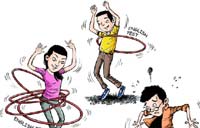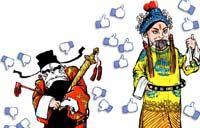The Chinese art of mythmaking
Updated: 2014-05-29 10:36
By Raymond Zhou(China Daily)
|
||||||||
 |
| Language should be a matter of choice |
By the time experts come out to clarify, the damage is done. The clarification piece would at best make a small dent in the colossal machine of myth-making.
Misinformation flourishes with issues closest to the hearts of the Chinese people. Education is one. Because many in China are frustrated with the education system, stories from the US are needed as a contrast. Meanwhile, Chinese parents will use the "next-door kid" approach to justify their method of discipline. Likewise, Chinese show their displeasure at official corruption by spreading stories in which foreign bureaucrats were sacked for taking laughably small favors.
Mind you, not all of these stories are fabricated a la the Harvard professors' books. Some are true stories distributed by bona fide news organizations. Others have a modicum of truth, but got embellished as they went around. However, they provide a partial picture if not a distorted one.
If housing prices in China are obscenely high, those in other countries must be affordable, as attested by comparative photos with prices attached. Never mind that it's ludicrous in the first place to compare an apartment within Beijing's Third Ring Road with a house in Montana.
Many people are impatient with stories with context because the subtleties and nuances confuse them, depriving them of the pleasure of drawing simple conclusions. If you say Chinese education has certain advantages that the American way does not, and vice versa, as I have sometimes done, you'll offend both the pro-Chinese-education camp and the opposing camp. Both sides will see you as an enemy.
The third party as contrast is a natural development of an earlier trend, which is the third party as confirmation. We used to love this approach, citing foreigners' customary congratulations as testament of the high quality of our artistic works.
Just at the turning point when many Chinese awoke to this pitfall, along came Wolfgang Kubin, a German Sinologist who categorically branded Chinese literature as "trash". He grew to be the voice for Chinese discontent with our own literary scene.
I suspect that even when he stops critiquing Chinese literature people will make up quotes and attribute to him. If I come up with "20 reasons I hate Chinese literature" and put down Kubin's name, I can guarantee the piece will hit every website in China within a day.
For more X-Ray stories, click here

 Music at her fingers
Music at her fingers
 Across America Over the Week (Jan 16 - Jan 22)
Across America Over the Week (Jan 16 - Jan 22)
 Spend Chinese New Year in style
Spend Chinese New Year in style
 Ili river valley becomes a popular destination for swans
Ili river valley becomes a popular destination for swans
 Philip Ma: from scientist to businessman
Philip Ma: from scientist to businessman
 Birmingham's Spotlight on China dinner
Birmingham's Spotlight on China dinner
 How to distinguish doucai, wucai, Famille-rose and enamel porcelain
How to distinguish doucai, wucai, Famille-rose and enamel porcelain
 Xinjiang lake in bumper fishing season
Xinjiang lake in bumper fishing season
Most Viewed
Editor's Picks

|

|

|

|

|

|
Today's Top News
Houston's SW Chinatown
China to focus on reforms, opening of capital market
Slowdown brings new risks to banks
Trade group calls for BIT
Market status for China is 'political' issue
Birmingham's Spotlight on China dinner
Bank takes renminbi-clearing seriously
Traditional Garb
US Weekly

|

|










